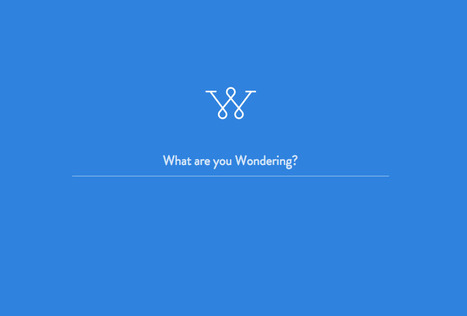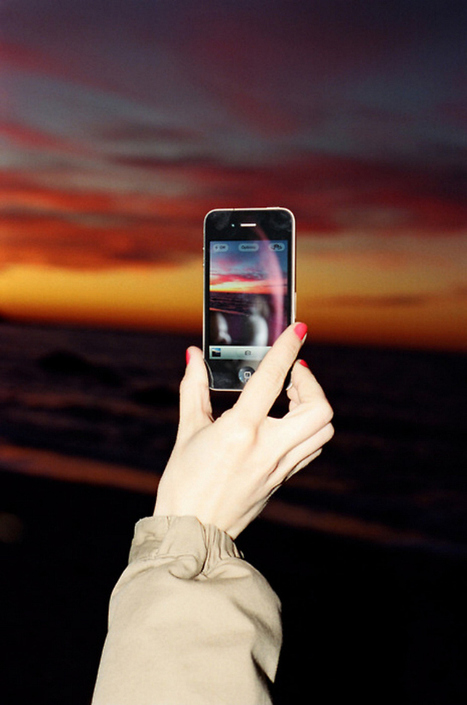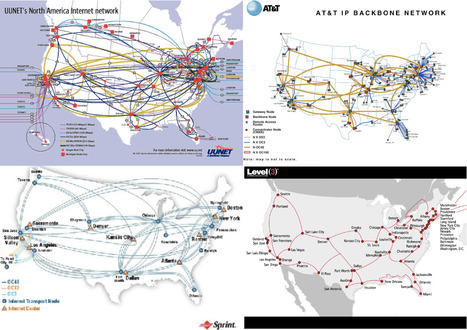"Inquiry that desires a deeper understanding and multiple points of view."

|
Scooped by Robin Good |
"Wonder was built to bring human-centric guidance back to the pursuit of knowledge on the web."
in other words: "Away from algorithmically sorted lists of links, and back to human-guided curation, evaluation and advice for those who don't need just a store address on a map".
Wonder is a new free web service which touts to be your online personal research assistant. Behind its minimalist website there's a crew of human beings that actually goes out to gather and bring back to you valuable answers and resources to your questions.
How does it work?
You just register via FB, Twitter or with your own email and then you are presented with a very simple screen in which you are asked "what are you wondering"?
You type in a question, and within a very reasonable amount of time (in my cases, in always less than 30 minutes) you receive a hand written email answer by a person with a first and last name. Not only. The person provides you also with multiple links to relevant resources that can help you find out and discover more about the topic of your interest.
Why it's relevant: Independently of the quality of the results that Wonder may initially bring to you, this new service highlights a growing trend toward trusted guides, expert curators of information, and their human voice and away from algorithmically sorted list of results like Google offers.
P.S.: In my initial tests a reply for a very specific question in one of my areas of expertise didn't bring back particularly valuable or useful suggestions as this knowledge would require an expert in the field, but less specialistic questions brought back useful responses written in a very human-style and supported by very high-quality relevant links and resources.
Here is one such question - answer as an example for you:
My Research Request:
How can I trust the answers provided by those behind Wonder if I know nothing about who they are?
Mike Smith reply:
Let me assure you, I am no robot. The resources curated by Wonder are compiled and collated by real human beings (such as myself) who take the time to sort through the vast amount of information available on the web.
I view the task of the Wonder researcher as being rather similar to that of your local librarian. And any good librarian isn't going to tell you how to think: they will present you with what knowledge and information they have available and arrange it in such a way that you must come to your own conclusion. Do you demand the librarian's credentials? Do you peruse their degrees and certifications? No, because her/his credentials lie in the quality of the work they have laid before you. Even if you detect bias or prejudice in what has been presented to you, then the curator's task has already been accomplished: you have assessed, for yourself, the quality of the information you have encountered and have honed your critical faculties that much more.
View Research
- Content curation (i.e. Wonder) is similar to consulting a librarian for literature on a particular subject
- Content curators (e.g. librarians) have empirically improved critical thinking skills in students
- Content curators (e.g. librarians) are tasked with fostering critical thinking in the evaluation of information sources
This is the future in preview.
Try it out and see what you think of it.
Free to use.
Try it out now: https://wonderlib.com/



 Your new post is loading...
Your new post is loading...














https://acheterozempic5mg.com/
https://acheterozempic5mg.com/shop/
https://acheterozempic5mg.com/product/acheter-adipex-37-5-mg/
https://acheterozempic5mg.com/product/acheter-mounjaro-en-ligne/
https://acheterozempic5mg.com/product/acheter-ozempic-0-25/
https://acheterozempic5mg.com/product/acheter-ozempic-1mg/
https://acheterozempic5mg.com/product/acheter-ozempic-0-5-mg/
https://acheterozempic5mg.com/product/acheter-ozempic-2mg/
https://acheterozempic5mg.com/product/acheter-saxenda-en-ligne/
https://acheterozempic5mg.com/product/acheter-wegovy-en-ligne/
https://acheterozempic5mg.com/product-category/medicaments-contre-l...
https://acheterozempic5mg.com/product/acheter-de-loxycodone/
https://acheterozempic5mg.com/product/acheter-percocet-en-ligne/
https://acheterozempic5mg.com/product/acheter-morphine-en-ligne/
https://acheterozempic5mg.com/product/acheter-depo-testosterone/
https://acheterozempic5mg.com/product/acheter-vyvanse-en-ligne/
https://acheterozempic5mg.com/product/acheter-zepbound-en-ligne/
https://ozempickopen.com/
https://ozempickopen.com/shop/
https://ozempickopen.com/product-categorie/weight-loss-medications/
https://ozempickopen.com/product/koop-ozempic-0-25mg/
https://ozempickopen.com/product/koop-ozempic-0-5mg/
https://ozempickopen.com/product/koop-ozempic-1mg-online/
https://ozempickopen.com/product/koop-ozempic-2mg-online/
https://ozempickopen.com/product/koop-adipex-online/
https://ozempickopen.com/product/mounjaro-kopen/
https://ozempickopen.com/product/koop-mounjaro-online/
https://ozempickopen.com/product/saxenda-kopen/
https://ozempickopen.com/product/koop-wegovy-online/
https://ozempickopen.com/product/koop-zepbound-online/
https://ozempickopen.com/product/koop-rybelsus-online/
https://ozempickopen.com/product/koop-oxycodon-5mg/
https://ozempickopen.com/product/koop-oxycodon-10-mg/
https://ozempickopen.com/product/oxycodon-kopen-online/
https://ozempickopen.com/product/oxycodon-kopen/
https://ozempickopen.com/product/koop-morfine-online/
https://ozempickopen.com/product/koop-depo-testosterone/
https://ozempickopen.com/product/koop-anadrol-oxymetholone/
https://ozempickopen.com/product/koop-oxymetholone-50-mg/
https://ozempiccomprar1mg.com/
https://ozempiccomprar1mg.com/compra-ahora/
https://ozempiccomprar1mg.com/product/ozempic-comprar-sin-receta/
https://ozempiccomprar1mg.com/product/comprar-ozempic-online/
https://ozempiccomprar1mg.com/product/comprar-ozempic/
https://ozempiccomprar1mg.com/product/comprar-ozempic-2mg/
https://ozempiccomprar1mg.com/product/comprar-mounjaro-sin-receta/
https://ozempiccomprar1mg.com/product/comprar-saxenda-espana/
https://ozempiccomprar1mg.com/product/comprar-wegovy-en-linea/
https://ozempiccomprar1mg.com/product/comprar-actiskenan/
https://ozempiccomprar1mg.com/product/comprar-metadona-en-linea/
https://ozempiccomprar1mg.com/product/comprar-oxicodona-5mg/
https://ozempiccomprar1mg.com/product/comprar-oxycontin-10mg-en-linea/
https://ozempiccomprar1mg.com/product/comprar-depo-testosterone/
https://ozempickopen.com/product/koop-oxycodon-10-mg/
https://ozempickopen.com/product/oxycodon-kopen-online/
https://ozempickopen.com/product/oxycodon-kopen/
https://ozempickopen.com/product/koop-oxycontin-online/
https://ozempickopen.com/product/koop-morfine-online/
https://ozempickopen.com/product/koop-adipex-online/
https://ozempickopen.com/product/koop-depo-testosterone/
https://acquistoozempic.com/
https://acquistoozempic.com/acquista-il-tuo-iniettabile-ozempic/
https://acquistoozempic.com/Prodotto/acquista-ozempic-0-25-mg/
https://acquistoozempic.com/Prodotto/acquisto-ozempic-senza-ricetta/
https://acquistoozempic.com/Prodotto/acquista-ozempic-1mg/
https://acquistoozempic.com/Prodotto/acquisto-ephedrine/
https://acquistoozempic.com/Prodotto/acquista-phentermine-online/
https://acquistoozempic.com/Prodotto/acquista-saxenda-online/
https://acquistoozempic.com/Prodotto/acquisto-wegovy-online/
https://acquistoozempic.com/Prodotto/acquista-mounjaro-5-mg/
https://acquistoozempic.com/Prodotto/acquista-zepbound-2-5-mg/
https://acquistoozempic.com/Prodotto/acquista-zepbound-10-mg/
https://acquistasubutexonline.com/
https://acquistasubutexonline.com/prodotto/
https://acquistasubutexonline.com/prodotto/acquista-ozempic/
https://acquistasubutexonline.com/prodotto/acquista-saxenda-online/
https://acquistasubutexonline.com/prodotto/acquista-wegovy-in-italia/
https://acquistasubutexonline.com/prodotto/acquista-zepbound/
https://acquistasubutexonline.com/prodotto/acquista-subutex-online/
https://acquistasubutexonline.com/prodotto/acquista-methadone-in-it...
https://acquistasubutexonline.com/prodotto/acquista-actiskenan-online/
https://acquistasubutexonline.com/prodotto/acquista-morphine-online/
https://acquistasubutexonline.com/prodotto/acquista-ossicodone-online/
https://acquistasubutexonline.com/prodotto/efedrina-acquisto-online/
https://acquistasubutexonline.com/prodotto/acquista-vyvanse-online/
https://acquistasubutexonline.com/prodotto/acquista-methadone-in-it...
https://acquistasubutexonline.com/prodotto/acquista-adipex-online/
https://acquistasubutexonline.com/prodotto/acquista-victoza-online/
https://acquistasubutexonline.com/prodotto/acquista-qsymia-online/
https://acquistasubutexonline.com/
https://acquistasubutexonline.com/prodotto/
https://acquistasubutexonline.com/prodotto/acquista-saxenda-online/
https://acquistasubutexonline.com/prodotto/acquista-subutex-online/
https://acquistasubutexonline.com/prodotto/acquista-victoza-online/
https://acquistasubutexonline.com/prodotto/acquista-qsymia-online/
https://acquistasubutexonline.com/prodotto/acquista-qsymia-online/
https://acquistasubutexonline.com/prodotto/acquista-duromine-online/
https://acquistasubutexonline.com/prodotto/acquista-methadone-in-it...
https://acquistasubutexonline.com/prodotto/acquista-actiskenan-online/
https://acquistasubutexonline.com/prodotto/acquista-morphine-online/
https://acquistasubutexonline.com/prodotto/acquista-ossicodone-online/
https://acquistasubutexonline.com/prodotto/acquista-dexedrine-online/
https://acquistasubutexonline.com/prodotto/acquista-pillole-analog-...
https://acquistasubutexonline.com/prodotto/acquista-ritalin/
https://acquistasubutexonline.com/prodotto/acquista-vyvanse-online/
https://acquistasubutexonline.com/prodotto/efedrina-acquisto-online/
https://acquistasubutexonline.com/prodotto/acquista-toseina-codeine/
https://acquistasubutexonline.com/prodotto/acquista-adipex-online/
https://acquistasubutexonline.com/prodotto/acquista-belviq-online/
https://acquistasubutexonline.com/prodotto/acquista-duromine-online/
https://acquistasubutexonline.com/prodotto/acquista-ozempic/
https://acquistasubutexonline.com/prodotto/acquista-ossicodone-online/
https://acquistasubutexonline.com/prodotto/acquista-qsymia-online/
https://acquistasubutexonline.com/prodotto/acquista-wegovy-in-italia/
https://acquistasubutexonline.com/prodotto/8311acquista-xenical-onl...
Aeropuerto Adolfo Suárez Madrid-Barajas
@gmail.com
koop ozempic Nederland
koop ozempic voor gewichtsverlies
Koop pillen om af te vallen
koop ozempic 0.25 mg
koop depo testosterone 200mg
koop wegovy
acquista saxenda
acquista subutex online
acquista ozempic
acquista qsymia
koop ozempic Amsterdam
koop ozempic Rotterdam
koop ozempic Eindhoven
mounjaro koop
zepbound koop
rybelsus koop
saxenda koop
wegovy koop
koop oxycodon-10
oxycodon 40mg koop
koop oxycodon
oxycontin koop
morfine koop
adipex koop
koop Depo Testosterone
koop oxymetholone 25 mg
koop oxymetholone 50 mg
acquisto ozempic
ozempic prezzo
acquistare ozempic 0.5mg
acquistare ozempic senza ricetta
acquistare ozempic 1mg
acquistare ephedrine
acquistare phentermine
acquistare saxenda
acquistare wegovy
ozempic comprar 1mg "> acquistare ozempic 1mg
comprar ozempic 1mg
ozempic comprar sin receta
ozempic comprar online
ozempic comprar
comprar ozempic 2mg
comprar mounjaro
comprar wegovy
comprar saxenda
comprar oxycontin-10mg
comprar depo testosterone
acheter ozempic
Acheter Ozempic 0.25 mg
Acheter Ozempic 0.25 mg
Acheter Ozempic 0.5 mg
ozempic perte de poid
ozempic saxenda
ozempic wegovy en ligne
ozempic perte de poid
ozempic oxycodone en ligne
ozempic percocet en ligne
ozempic morphine en ligne
ozempic testosterone en ligne
ozempic vyvanse en ligne
ozempic zepbound en ligne
acquista subutex online
acquista saxenda
acquista subutex
acquista victoza
acquista qsymia
acquista duromine
acquista methadone
acquista actiskenan
acquista morphine
acquista oxicodona
acquista sevredol
acquista dexedrine online
acquista pillole
acquista ritalin
acquista vyvanse
efedrina acquisto
acquista adipex
acquista belviq
acquista duromine
acquista ozempic
acquista qsymia